“The government is now taking measures to reduce the difficulties that result from rising prices.”
PM Abdullah Ahmad Badawi on his government’s cost-cutting measures to counter a whopping oil price increase announced by none other than himself.
Rising oil prices is a global problem the local man on the street has to come to grasps with. So I shall write this from a completely layman’s point of view. Experts are welcome to share more in the comments section.
Yet it is understandable why the average Joe from oil-exporting Malaysia is finding it hard to comprehend the rationale behind his government’s overnight move to increase petrol prices by more than 40% after months of noncommittal statements regarding the issue.
Simplistically put, a net exporting (exports > imports) country like Malaysia should profit when global oil prices increase. Demand for oil is ever increasing, but the limited supply (that would inevitably run out one day) pushes the value of this prized commodity up.
So, logically speaking, an oil-rich country like Malaysia, which is projected to be a net exporter until 2014, is making more money when prices skyrocket. Why is the country suffering from the “effects of global oil prices” then?
Let’s see what the government has to say for itself. In defense of this unpopular move, Abdullah has said that increasing oil prices burden the government because, in order to have domestic oil prices remain low, it has to hence increase subsidies, which is economically unsound in the longer term. Plainly put, the money for subsidies could be better used.
“Hey, but aren’t we making effing tons more than that just exporting our oil?” Screams the frustrated consumer.
Shockingly, Malaysian national oil company Petronas has washed its hands clean off this issue. Its accounts are not open for public scrutiny. It is categorically irresponsible to the rakyat, and only answerable to its “stakeholders”, which spells, invariably, in the letters of U, M, N, and O.
My comments in the above may sound reckless, I’ll try to put it in a less emotive manner. First, below are excerpts from comments recently made by Petronas President and CEO Mohd Hassan Marican:
Petronas could go bust by 2018 (June 6, 2008)
KUALA LUMPUR: Petronas will go bust within 10 years if all its profits are handed to the Government to continue subsidising fuel, said its president and chief executive officer Tan Sri Hassan Marican.
He warned that many national petroleum companies in the world have ceased to exist or were in financial trouble today because all their profits were taken away from them.
“Petronas has played a major role by giving back a substantial amount of its profits to the Government,” he added.
At the close of its financial year in March last year, the national petroleum company had given the Government RM52.3bil in taxes, royalties and dividends which worked out to be 32% of the Federal Government’s revenue.
“Since the formation of Petronas in 1974 to last year, the company gave the Government RM335.7bil out of a total profit of RM570bil,” Hassan said.
Commenting on the fuel price increase, the Petronas boss said the corporation did not make a sen from the increase.
“All the oil companies get full market price for the petrol and diesel that they sell and the Government pay them the difference from the fixed price. This is where the subsidy comes into play,” he added.
and…
Petronas calls for removal of fuel subsidies (June 10, 2008)
“While the industry is stepping up efforts to bring more energy to the market, much needs to be done on the consumer end to ensure that greater energy efficiency is achieved,” he said at the 13th Asia Oil & Gas Conference yesterday.
“While this is being pursued, nations must also work towards a gradual removal of generous energy subsidies, which cause unmitigated consumption and market distortions that are unmanageable in the long run.”
The dichotomy hence is that Petronas is not the Malaysian government, and vice versa. Petronas is a government linked company, but it is apparently bound to private interest, profits, which sets its role apart from that of the government. They pay the Malaysian government taxes, royalties, dividends, etc. So, that’s the Malaysian government’s oil revenue. So, tell me, who is Petronas answerable to? Frankly, I don’t know, but aren’t Malaysians, each and every one of them stakeholders of Malaysia’s natural resources?
The question thus, is where Petronas’ profits has gone to. Apart from giving back to the government (which the government then uses as subsidies), apart from re-investing in technology, drilling, and exploration, where has its profits gone to? Does the rakyat really have no claim whatsoever to Petronas?
Let’s not forget 2014 is not that far away a future. Globally, an oil crisis is impending. Already, a food crisis is looming. What does Abdullah’s administration have in their plans? What does Petronas have in mind?
Malaysia has practically zero plans in store for alternative reproducible energy. Other than pushing the consumers to conserve, we have seen nothing else worthy of note. Lots of rhetoric, no mechanism.
Abdullah has urged Malaysians to “change lifestyles”, and he wants to be seen taking the lead, which is the gist of the opening quote of this post. But really, how much more can be changed?
The rakyat are now taking to the streets. Opposition leader Anwar Ibrahim has promised a “Million Marchers” rally to oppose Abdullah’s decision, and claims September 16th will be the last Malaysians see of this inhumane, corrupt, and unjust government.
Or will we not?
~~~~~
The world closing in
Did you ever think
That we could be so close,like brothers
The future’s in the air
I can feel it everywhere
Blowing with the wind of change
Take me to the magic of the moment
On a glory night
Where the children of tomorrow dream away
In the wind of change
Walking down the street
Distant memories
Are buried in the past forever
Scorpions – Wind of Change

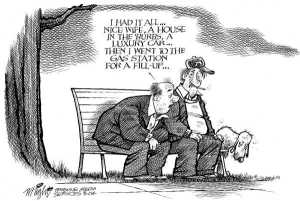
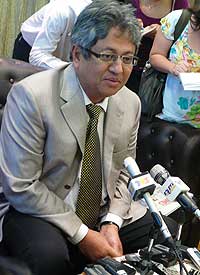
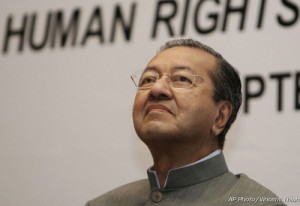
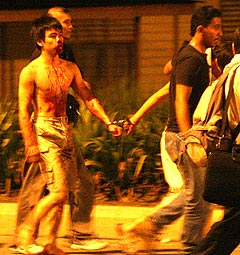
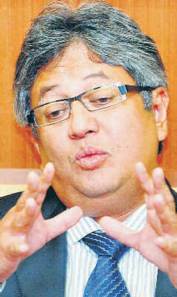

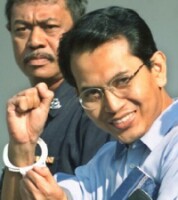

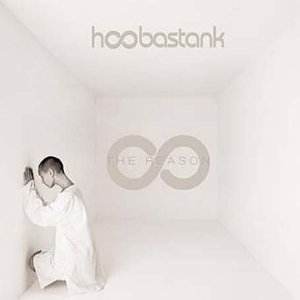

You were saying